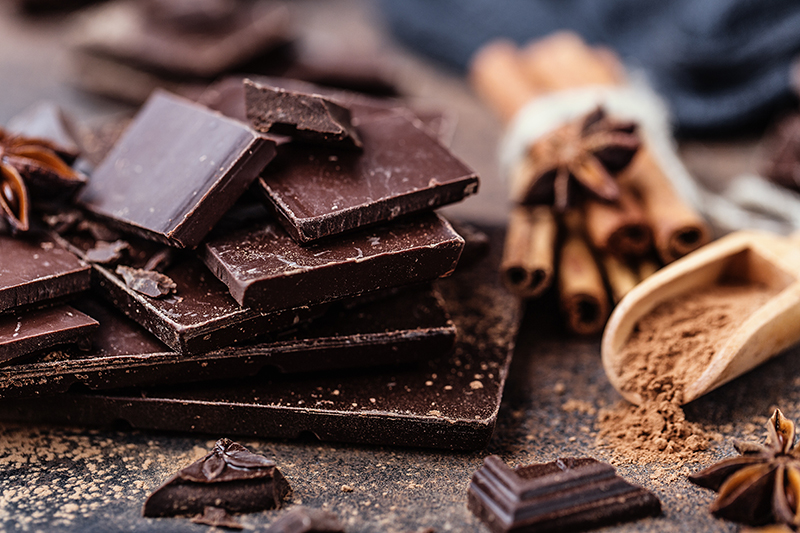All the good things you’ve heard about dark chocolate are right. It has the power to protect our heart, and provide valuable minerals we need for overall good health. The level of antioxidants in dark chocolate are higher than some of the so-called superfoods.
But does chocolate have a dark side? It’s not all good news; even dark chocolate shouldn’t be consumed in high quantities despite its health benefits. The saying ‘everything in moderation’ rings true when it comes to even dark chocolate.
What is Dark Chocolate?
Chocolate is made from beans of the cocoa tree. After harvesting from the tree, the beans are removed from their pod, fermented, dried, and roasted. The beans are ground to a cocoa mass or liquor which can be pressed to make cocoa butter and cocoa cake for grinding into powder. Cocoa liquor can be combined with cocoa butter, sugar and vanilla to make dark chocolate.
Also known as plain chocolate, the percentage of cocoa solids classifies dark chocolate. To be marketed as dark chocolate, it needs to contain a minimum 70% cocoa content.
Origins & History
The cocoa bean has a 4,000-year history. The ancient Inca and Mayan rulers drank small quantities up to 50 times per day to increase virility, despite its bitter taste. It was also thought to increase energy, happiness, stamina and focus. In the 1500s, cocoa beans were considered so valuable that they became the currency.
In 1828 a Dutch chemist invented a cocoa press which could squeeze out the cocoa butter from the roasted beans to then pulverise into a fine powder. The powder could be mixed with other ingredients and poured into moulds so that it can be eaten rather than drunk. In Britain in 1847, the first edible chocolate bar was made.
Rodolphe Lindt improved the texture and taste and began mass production in 1879. Cadbury, Mars and Hershey produced the first chocolates of the boom in the late 1800s and early 1900s.
The Claimed Benefits of Dark Chocolate
It’s no surprise that dark chocolate has health benefits. For hundreds of years, cocoa was consumed for its medicinal properties. Now we have research to back up the thoughts of our ancient forebears.
Heart Health
Flavanols and magnesium in dark chocolate keep the blood vessels open and regulate the heart rate improving the cardiovascular system. A study revealed that eating chocolate two or more times per week lowered the risk of calcified plaque in arteries by 32%.
Diabetes
Unlike other forms of chocolate, the dark variety lowers blood sugar levels. The cocoa makes the body more sensitive to insulin which reduces the risk of type 2 diabetes.
Brain Function
Dark chocolate increases blood flow to the brain and decreasing inflammation. The minerals in chocolate have also shown to reduce the chance of Alzheimer’s disease and dementia.
Reduces Blood Pressure
It’s not just the heart that benefits from dark chocolate’s flavanols and magnesium, blood pressure can also be reduced. Lower blood pressure decreases your risk of stroke, cardiovascular disease and dementia.
Asthma
People with asthma may not experience constricted bronchial passages and bronchospasms as often after consuming chocolate due to its caffeine, theobromine and theophylline.
Tooth Decay
Eating dark chocolate can even protect your teeth as the theobromine hardens tooth enamel.
Sun Protection
With long-term consumption, dark chocolate builds UV resistance and improved blood flow to the skin and hydration. Minimal erythemal dose (MED) is the minimum amount of UVB rays needed to cause skin redness 24 hours after exposure. A study showed that participant’s MED more than doubled after consuming dark chocolate for 12 weeks. The flavanols in dark chocolate also reduce stress hormones which break down the skin’s collagen.
Inflammation
An Italian study found people who ate small to moderate amounts of chocolate had lower levels of C-reactive protein which is a marker of inflammation.
Cholesterol Levels
Cocoa powder has been linked to decreased oxidised LDL (bad) cholesterol in men. It can also increase HDL (good) cholesterol.
Improve your Mood
Dark chocolate can increase your serotonin and endorphin levels thereby improving your mood and sense of well-being.
Aphrodisiac
Less stress and improved energy levels mean cocoa has been used as an aphrodisiac in modern and ancient times.
Flavonoids
Dark chocolate is one of the highest sources of flavonoids which benefit the cardiovascular system. In a small study of dark chocolate consumption, results showed reduced inflammation in women, improved lipid profiles and decreased platelet reactivity.
Are there any Health Concerns?
For all its health benefits. there are still some concerns about overeating dark chocolate.
Caffeine
Dark chocolate has a higher quantity of caffeine compared to other varieties of chocolate. Consuming too much caffeine can cause insomnia if eaten before bed, increased heart rate, anxiety, irritability and nervousness. Some people are more sensitive to caffeine than others so consider if you need to cut back on other caffeine products if you are going to enjoy a large bar of dark chocolate during the same day.
Kidney stones
For people who have had a kidney stone in the past or are predisposed to getting a stone, it may be wise to avoid dark chocolate. The oxalates in the chocolate increase urinary oxalate excretion which increase the risk of kidney stones. Kidney stones can be extremely painful and could require a trip to hospital.
Migraines
The natural chemical in chocolate, tyramine, may be a trigger for migraine headaches. The high sugar content can also raise blood sugar levels which is another trigger for migraines.
Should you Limit Your Consumption of Dark Chocolate?
While dark chocolate delivers a powerful punch regarding health benefits, more is not always better. There are the immediate symptoms of indigestion and nausea from overindulging plus the more long-term impact including:

Sugar
Dark chocolate might not have the same quantity of sugar as some of the other kinds of chocolate, but it still contains high levels that aren’t good for you. It is known as a calorie dense food because of the calories from the sugar and fat. High calories increase your chance of obesity and cardiovascular disease.
Lead and Cadmium Contamination
Trace amounts of lead have been found in numerous samples of dark chocolate. Cadmium, a probable human carcinogen, has also been found in chocolate. No one is entirely sure how these elements make their way into chocolate. There is one thought that it’s a naturally occurring process where the cocoa plant absorbs the lead, but another study showed that lead contamination occurs during the shipping and manufacturing process of the cocoa bean. Lead and cadmium are also found in the fertilisers and pesticides used on the cocoa plants.
Cadmium is present in other foods such as cereals, vegetables and nuts. We consume higher quantities of these foods than we do dark chocolate, so the amount of cadmium in chocolate is negligible.
Stay tuned for know more


